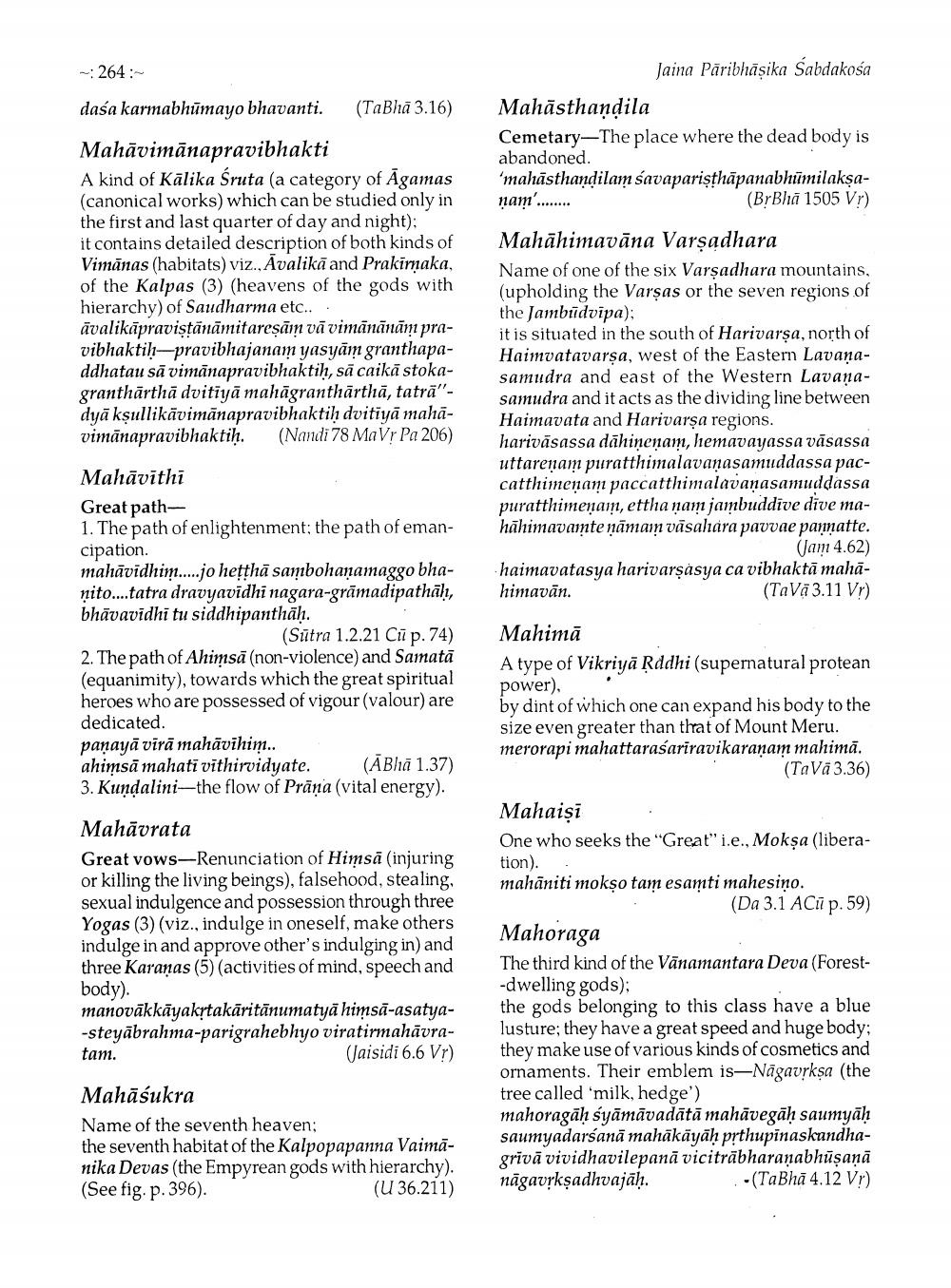________________
264
dasa karmabhūmayo bhavanti.
(Tabhā 3.16)
Mahāvimānapravibhakti A kind of Kālika Śruta (a category of Āgamas (canonical works) which can be studied only in the first and last quarter of day and night); it contains detailed description of both kinds of Vimanas (habitats) viz., Avalikā and Prakimaka, of the Kalpas (3) (heavens of the gods with hierarchy) of Saudharma etc... āvalikāpravistānāmitaresāın vā vimānānām pravibhaktih-pravibhajanam yasyām granthapaddhatau sā vimānapravibhaktih, să caikā stokagranthārthā dvitiyā mahāgranthārthā, tatrā"dyā kşullikāvimānapravibhaktih dvitiyā mahāvimānapravibhaktih. (Nandi 78 MaVr Pa 206)
Jaina Pāribhāṣika Sabdakosa Mahāsthandila Cemetary-The place where the dead body is abandoned. 'mahāsthandilam savaparişthäpanabhümilakṣanam ......
(BrBhā 1505 Vr) Mahāhimavāna Varsadhara Name of one of the six Varşadhara mountains, (upholding the Varsas or the seven regions of the Jambūdvipa); it is situated in the south of Harivarşa, north of Haimvatavarşa, west of the Eastern Lavanasamudra and east of the Western Lavanasamudra and it acts as the dividing line between Haimavata and Harivarşa regions. harivāsassa dāhinenam, hemavayassa vāsassa uttarenam puratthimalavanasamuddassa paccatthimenam paccatthimalavaṇasamuddassa puratthimeņain, etthanam jambuddive dive mahāhimavante ņāmai vāsahara pavvae pannatte.
(Jam 4.62) haimavatasya harivarşasya ca vibhaktā mahahimavān.
(Tavā 3.11 Vr)
Mahāvīthi Great path1. The path of enlightenment; the path of emancipation mahāvidhim.....jo hetthā sambohanamaggo bhanito....tatra dravyavidhi nagara-grāmadipathāh, bhāvavidhi tu siddhipanthāḥ.
(Sutra 1.2.21 Chi p.74) 2. The path of Ahimsā (non-violence) and Samatā (equanimity), towards which the great spiritual heroes who are possessed of vigour (valour) are dedicated panayā virā mahāvihim.. ahimsā mahati vithirvidyate. (ABhä 1.37) 3. Kundalini-the flow of Prāņa (vital energy).
Mahimā A type of Vikriya Rddhi (supernatural protean power), by dint of which one can expand his body to the size even greater than that of Mount Meru. merorapi mahattarasariravikaranam mahimā.
(TaVā3.36)
Mahāvrata Great vows-Renunciation of Himsā (injuring or killing the living beings), falsehood, stealing, sexual indulgence and possession through three Yogas (3) (viz., indulge in oneself, make others indulge in and approve other's indulging in) and three Karanas (5) (activities of mind, speech and body). manovākkāyakstakāritānumatyā himsa-asatya-steyābrahma-parigrahebhyo viratirmahāvratam.
(Jaisidi 6.6 Vr)
Mahaisi One who seeks the "Great" i.e., Mokşa (liberation). mahāniti mokso tam esamti mahesino.
(Da 3.1 ACū p. 59) Mahoraga The third kind of the Vānamantara Deva (Forest-dwelling gods); the gods belonging to this class have a blue lusture; they have a great speed and huge body; they make use of various kinds of cosmetics and ornaments. Their emblem is-Nägavrksa (the tree called 'milk, hedge') mahoragāh syāmāvadātā mahāvegāḥ saumyāḥ saumyadarsanā mahākāyāh prthupinaskandhagrīvā vividhavilepanā vicitrābharaṇabhūşaņā nāgavíkṣadhvajāḥ. :-(TaBhā 4.12 V)
Mahāśukra Name of the seventh heaven; the seventh habitat of the Kalpopapanna Vaimanika Devas (the Empyrean gods with hierarchy). (See fig. p. 396).
(U 36.211)




